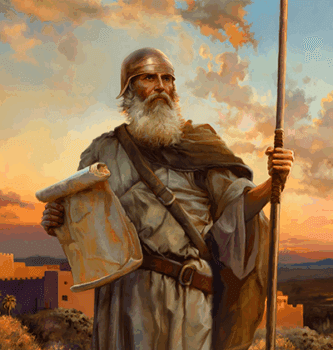8: Giants of Faith: Joshua and Caleb — Teaching Plan
Key Thought: Joshua and Caleb had a strong faith in God that enabled them to stand boldly in defense of right. Through reliance in the same power, every true believer may receive strength and courage to overcome the most challenging trials.
November 22, 2025
1. Have a volunteer read Joshua 14:6-14, Numbers 14:24, 32:12.
- Ask class members to share a short thought on what the most important point is in this passage.
- What does it say about Caleb that he was willing to speak his mind against the majority of the spies and the people threatened to kill him?
- Personal Application: What do you usually do when most people around you have a different opinion that goes against what you feel is right? How do we determine if we are being true to standards or just stubborn and hard headed? Share your thoughts.

- Case Study: One of your relatives states, “How powerful is peer pressure in our society and in our lives today? What role does courage play in the practicing of faith in spite of peer pressure? What role do parents and upbringing play in courage to stand up to evil?” How would you respond to your relative?
2. Have a volunteer read Joshua 15:16-19, Judges 1:13, 3:7-11.
- Ask class members to share a thought on what the most important point in this text is.
- What does this story tell you about the power of example? How is Caleb’s attitude being reproduced in the younger generation?
- Personal Application: What small compromises are the kinds that can keep us from following the Lord fully?
- Case Study: One of your friends states, “Abraham is a great example of faith, and yet there are times in his life when he didn’t show a strong faith. What things did Abraham do that showed some challenges to his faith? What does this show us about God’s dealings with him and also with us in our Christian growth in faith?.” How would you respond to your friend?
3. Have a volunteer read Joshua 19:49-51.
- Ask class members to share a short thought on what the most important point in this text is.
- What does it tell us about Joshua that he receives the land inheritance last?
- Personal Application: What lessons can we learn from Joshua’s attitude? How can we apply that attitude to ourselves today? Share your thoughts.
- Case Study: One of your neighbors states: “What are the traits of people that are worth following? What are some examples of faith you have seen in your church or community? ” How would you respond to your neighbor?
4. Have a volunteer read Hebrews 12:1,2. 2 Corinthians 3:18.
- Ask class members to share a thought on what the most important point in this text is.
- How does focusing on Jesus’ life and the lives of heroes of faith change us?
- Personal Application: What two processes work for conflicting purposes in our lives? How can we be sure to give room to the right one? Share your thoughts.
- Case Study: Think of one person who needs to hear a message from this week’s lesson. Tell the class what you plan to do this week to share with them.
(“Truth that is not lived, that is not imparted, loses its life-giving power, its healing virtue. Its blessings can be retained only as it is shared.” Ministry of Healing, p. 148).
